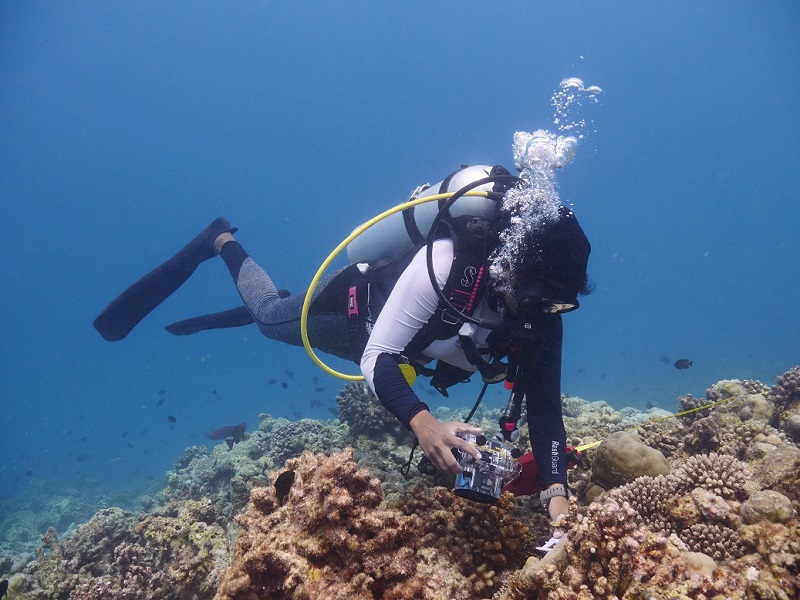Reef scientists across the Pacific have worked together to create a digital tool that uses machine learning and advanced analysis to rapidly extract and share data from images of coral reefs anywhere in the world.
Launched on the eve of the , is a user-friendly, open-access platform poised to revolutionise global coral reef monitoring and management by allowing the world’s coral reef monitoring community to work together, in real time.
ReefCloud standardises data collected from around the world, analysing coral reef composition with 80-90 percent accuracy, 700 times faster than traditional manual assessment, saving weeks and months of labour and freeing precious reef management resources.
ReefCloud was developed by the Australian Institute of Marine Science (AIMS) in collaboration with (PICRC), , the (ICRI), , , , and CO2 Consulting, with in kind support from .
Speaking at the launch at PICRC, Australian Ambassador for the Environment Jamie Isbister said ReefCloud brought a transformative change to the way we monitored our coral reefs and came at a critical time for global reef protection. It also included engagement with indigenous communities, many of whom play a key role in marine monitoring.
“Coral reefs are rapidly declining, with climate change being their single greatest threat globally,” Mr Isbister said.
“This platform is going to address key challenges by helping coral reef managers assess the condition of their reefs and take appropriate management actions. I’m pleased to note that Australia’s aid program provided support for the development of this platform.
“ReefCloud’s inaugural international roll-out is to Pacific island nations, in recognition of the vulnerabilities the region’s coral reefs face and the importance of coral reefs to the region’s health and prosperity.
“The Pacific is home to 27% of the world’s coral reefs, which is more than any other region. Reefs occur mainly around remote oceanic islands and communities are often very closely connected to their reef.”
Palau Minister of Agriculture, Fisheries and Environment Steven Victor said ReefCloud was an innovative tool that would enable the Pacific to work together towards the shared goals of development and protection of natural resources.
“ReefCloud will assist our reef managers with the most current and accurate data while helping to grow our scientific capability” he said.

Fijian Minister for Agriculture, Waterways and Environment Dr Mahendra Reddy said Fiji’s coastal communities depended on coral reefs for fishing and tourism and provided frontline defence against the impacts of climate change such as sea level rise.
“Fiji’s coral reefs are vulnerable to many threats, including climate change, overfishing and land-based pollution,” he said.
“Averting crisis depends on our collaborative effort and coordination amongst regional and international partners with government, non-government institutions and coral reef scientists who advance science-based technologies such as ReefCloud.”
AIMS Research Team Lead and ReefCloud Director said ReefCloud was the “democratisation of knowledge”.
“We’re partnering with the to support a transformation in coral reef monitoring,” he said.
“Last year, GCRMN released a which involved integrating reef monitoring efforts from 12,000 coral reef sites in 73 countries. With limited human resources it took years to painstakingly reconcile inconsistent data formats and methodologies.
“ReefCloud can automate that process, providing up-to-date information within hours, which leads to more timely and informed decisions on actions to improve the long-term sustainability of our coral reefs.”
PICRC CEO Dr Yimnag Golbuu said PICRC scientists played a key role in shaping and testing ReefCloud to ensure it was user-friendly and met local needs.
“We’re excited to be launching ReefCloud today and look forward to it being an integral tool to help our future reef monitoring efforts and inform Palau’s reef management decisions,” he said.
ReefCloud is a A$6.6M program, jointly funded by AIMS and the (DFAT). DFAT has provided an additional $200,000 to engage indigenous communities, many of whom play a key role in marine monitoring.
ReefCloud won an APSEA () in November 2021 and was one of its six Accenture Eco Innovation Challenge winners.








